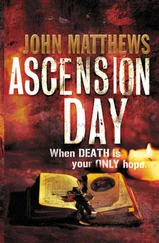John Matthews - Past Imperfect
Здесь есть возможность читать онлайн «John Matthews - Past Imperfect» весь текст электронной книги совершенно бесплатно (целиком полную версию без сокращений). В некоторых случаях можно слушать аудио, скачать через торрент в формате fb2 и присутствует краткое содержание. Жанр: Триллер, на английском языке. Описание произведения, (предисловие) а так же отзывы посетителей доступны на портале библиотеки ЛибКат.
- Название:Past Imperfect
- Автор:
- Жанр:
- Год:неизвестен
- ISBN:нет данных
- Рейтинг книги:4 / 5. Голосов: 1
-
Избранное:Добавить в избранное
- Отзывы:
-
Ваша оценка:
- 80
- 1
- 2
- 3
- 4
- 5
Past Imperfect: краткое содержание, описание и аннотация
Предлагаем к чтению аннотацию, описание, краткое содержание или предисловие (зависит от того, что написал сам автор книги «Past Imperfect»). Если вы не нашли необходимую информацию о книге — напишите в комментариях, мы постараемся отыскать её.
Past Imperfect — читать онлайн бесплатно полную книгу (весь текст) целиком
Ниже представлен текст книги, разбитый по страницам. Система сохранения места последней прочитанной страницы, позволяет с удобством читать онлайн бесплатно книгу «Past Imperfect», без необходимости каждый раз заново искать на чём Вы остановились. Поставьте закладку, и сможете в любой момент перейти на страницу, на которой закончили чтение.
Интервал:
Закладка:
'Well, it was just that we found no significant fibres of any type at the scene of the crime.'
'Any blood or semen deposits or indeed anything at all linking to any individual?'
'No, we found nothing.'
'So the fact that nothing was found linked to Monsieur Machanaud was not particularly significant?'
'No, not particularly.'
'But in one area of blood stains, I understand you did find something significant. An area of stains that was weaker and pinker than other areas. How do you think this occurred?'
Molet tensed, sat forward keenly. He'd known the information would come up at some point. He should have caught on when Perrimond didn't cover it earlier with Dubrulle. Perrimond's earlier tactic of grandstanding the fishing apron suddenly made sense, and now again he'd carefully engineered everything to make it a closing point.
'It looked as if someone had washed down with water, perhaps from the murder implement or their body. Washed away the boy's blood. It was the same group as the boy's, but had been mixed with water.'
'Now, if somebody in normal apparel,' Perrimond ran one hand down inside his suit lapel, 'say standard cotton shirt and trousers, had tried to swill off bloodstains in this fashion — would the blood have washed off successfully or left stains?'
'Very little of it would have washed off. Most of it would have soaked into the clothing.'
'But if this person was wearing some sort of protective waterproof clothing — say a plastic apron or bib of some type. Would it have washed off in this fashion then?'
'Yes, probably.'
'And such a bib would also have protected their clothing from stains, I presume?'
'Yes, obviously.'
'Thank you.' Perrimond sat down and Griervaut dismissed Dubrulle from the stand.
Molet's spirit's sank. Scanning the jury, the impact of the point had gone home strongly.
Testimony from attending medics and doctors was next. Looking at his watch, Molet realized that part of it was probably going to spill over to the next morning. Little arose as the day's events drew to a close to raise his spirits again. Now that Perrimond had stolen his thunder over forensics, there were precious few ace cards left to play. Any chance of clearing Machanaud had probably now gone. All that remained was the testimony of an ageing resistance fighter, an army doctor, and his own closing arguments to be able to save his client's life.
'And how long were you practising at the Military Hospital in Aubagne, Doctor Lanquetin?'
'Over twenty years. Though I'm retired now — just four years ago.'
'During that time, what did you specialize in?'
'In treatment of cranial injuries. I was a practising surgeon who dealt almost exclusively with head injuries incurred by soldiers or legionnaires in active service.'
'I see.' Molet looked down thoughtfully. It was an idea he'd struck on late in the instruction process, seeing the procession of character witnesses from Perrimond testifying to Machanaud's strange and oddball character. One of them had commented, 'I believe he even has a metal plate in his head, from a sabotage operation that went wrong while in the resistance .' Machanaud had originally fought the idea, felt that playing on his old injuries was merely supporting the opposition's case that he was mad and had done something strange that afternoon. Molet admitted then that he thought his chances of clearing Machanaud were remote, and this was probably their only hope of getting a lesser manslaughter charge introduced. Reluctantly, Machanaud had given him the name of the hospital where he was treated.
His old doctor had since died, but Molet managed to find a retired army doctor, Lanquetin, who was an expert in head injuries. He'd introduced him along with an old resistance colleague at a later instruction and argued strongly that a lesser charge of manslaughter should be introduced. 'Half of the prosecution case rests on the fact that Machanaud is slightly odd. Yet he has never done anything like this before, and in months of talking with my client, if indeed he has done this, he clearly has no memory of it. This is an old resistance fighter, one with a metal plate holding his head together. And we are going to argue on one hand that he is odd and slightly mad, yet on the other claim that he knew exactly what he was doing and condemn him to be hanged. Ridiculous! I move for a lesser charge of manslaughter to be introduced on the grounds of diminished responsibility, and will produce the medical evidence to strongly support it.' Predictably, Perrimond opposed the suggestion. Naugier accepted it reluctantly, but only as an alternative charge. The manslaughter charge would ride alongside that of premeditated murder. It would be up to the jury to decide of which they thought Machanaud was guilty.
'So your knowledge in the area of cranial injuries is quite extensive?'
'Yes.'
'And during this period have you had experience with metal plates and their effects on patients?'
'Yes, I have. Quite a bit.' Molet merely looked at him expectantly. Lanquetin continued. 'The effects can vary, but the plate is no more than a drastic, emergency solution to hold together two parts of the cranium that could possibly shift. As such, they may be affected by cold or hot weather, or even sudden movement. Electrical and chemical imbalances can be sparked off.'
'What would be the affect of such imbalances?'
'It varies enormously. It could be nothing more than a mild headache, slightly irritable behaviour or anxiety. Or at the other extreme, quite irrational, even violent behaviour.'
'So it is quite conceivable, Doctor Lanquetin, that someone with a metal plate — given the right conditions — could suffer a temporary memory loss. Have absolutely no recall whatsoever.'
'Yes it is.'
Molet produced the X-rays Lanquetin had viewed earlier, and Lanquetin confirmed that it was quite an extensive implant and that indeed, given its proximity to the parietal lobe which controlled both some motor and behavioural functions, given the right conditions there could be adverse affects.
'Thank you, Doctor Lanquetin.'
Perrimond spent very little time cross-examining Lanquetin, his main thrust was an attempt to discredit Lanquetin's grasp of 'modern medicine' due to the fact that he had now retired. But the ploy partly backfired when Lanquetin reminded him that metal plate implants were not particularly akin to modern surgery, and indeed the practice was fast dying out.
The conclusion of medical testimony and the various incidental and character witnesses had taken up most of the morning. Only one witness was left to call, Machanaud's old colleague from the resistance , Vincent Arnaud. Molet realized that the closing arguments would probably now have to follow after lunch, there wouldn't be time before.
Arnaud's testimony transported them back to another age: 1943. He and Machanaud were both in their late twenties, colleagues in the resistance fighting the Germans near Tours. A rag-tag bunch with limited resources doing the best they could. Arnaud described the dynamite set one day so that they could stop and ambush an ammunition truck. But the dynamite was damp, it went off late and the truck veered off the road, striking Machanaud.
'And was it this that caused your colleague Gaston Machanaud to be hospitalized and have a metal plate inserted?'
'Yes it was. It was days before we even knew whether he'd live or not.'
Whatever was decided later, thought Molet, with Arnaud on the stand it was once again Machanaud's finest hour. Machanaud's eyes welled with emotion. Old colleagues, old memories. And confirmation at last for all his doubters and detractors that his day of glory, the story he had spun over so many bar counters, had not just been drunken ramblings. Perhaps now everyone would believe him.
Читать дальшеИнтервал:
Закладка:
Похожие книги на «Past Imperfect»
Представляем Вашему вниманию похожие книги на «Past Imperfect» списком для выбора. Мы отобрали схожую по названию и смыслу литературу в надежде предоставить читателям больше вариантов отыскать новые, интересные, ещё непрочитанные произведения.
Обсуждение, отзывы о книге «Past Imperfect» и просто собственные мнения читателей. Оставьте ваши комментарии, напишите, что Вы думаете о произведении, его смысле или главных героях. Укажите что конкретно понравилось, а что нет, и почему Вы так считаете.












